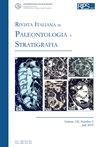中新世(中萨尔马西亚s.l .)耳石重建的东颌区特有海鱼区系;尤尔金(克里米亚刻赤半岛的比萨拉比亚)
IF 1.9
3区 地球科学
Q2 GEOLOGY
引用次数: 4
摘要
利用耳石重建硬骨鱼类化石区系是一种行之有效的方法,它可以在时间和空间上形成多样化和密集的记录。本文报道了来自克里米亚刻赤半岛Jurkine的中萨尔马提亚s.l.(中比萨拉比亚)丰富的耳石基鱼类区系。这项研究基于5000多个标本,包括36个不同的物种,其中24个是新物种,2个仍在公开命名法中。这个组合代表了比萨拉比亚的第一个主要耳石组合。它还代表了在东帕拉提提斯进化的最后一个连续受限海洋环境中的鱼类动物群,从巴登尼亚/塔克哈尼动物群中招募,并且没有受到随后的克尔森危机的影响。耳石组合的特点是具有高含量的地方性鱼类,这些鱼类来自于相对知名的早期萨尔马提亚s.l. (Volhynian)鱼类区系,并且它包含了某些区系元素,这些元素被困在当时与世隔绝的东Paratethys中,而没有进入更年轻的地层。这种强迫的地方性进化解释了新分类群的不同寻常的高百分比。鱼类区系以窄盐性陆架鱼类为主,显然是在卡拉干尼亚危机后从Konkian和早期的萨尔马提亚s.l (volhyian)区系吸收来的。在这种受限制的海洋环境中,鱼科和鱼科受益最多,而深水鱼类则随着卡拉干尼亚危机而消失。在本研究中,我们讨论了从相对有限的后bessarabian地层资料中可以重建的东部Paratethyan鱼类的进一步演化,并概述了该领域未来的研究目标。Jurkine剖面的地层层序正在根据一套详细的底栖有孔虫进行修订。讨论了其对中、上萨尔马提亚地区的地层学意义、边界以及刻赤半岛这部分地区的古环境。本文章由计算机程序翻译,如有差异,请以英文原文为准。
THE ENDEMIC MARINE FISH FAUNA FROM THE EASTERN PARATETHYS RECONSTRUCTED FROM OTOLITHS FROM THE MIOCENE (MIDDLE SARMATIAN S.L.; BESSARABIAN) OF JURKINE (KERCH PENINSULA, CRIMEA)
Reconstructing fossil bony fish faunas using otoliths is a well-established method that allows a diverse and dense record in time and space to be assembled. Here we report about a rich otolith-based fish fauna from the middle Sarmatian s.l. (middle Bessarabian) from Jurkine, Kerch Peninsula, Crimea. The study is based on more than 5,000 specimens constituting 36 different species, 24 of which are new and 2 remain in open nomenclature. This assemblage represents the first major otolith association described from the Bessarabian. It also represents a fish fauna from the last continuous restricted marine environment that evolved in the Eastern Paratethys, was recruited from the Badenian/Tarkhanian fauna, and was not affected by the subsequent Khersonian crisis. The association of otoliths is characterized by a high content of endemic fishes that derived from the relatively well-known early Sarmatian s.l. (Volhynian) fish fauna, and it contains certain faunal elements that were trapped in the then-secluded Eastern Paratethys and did not range into younger strata. This forced endemic evolution explains the unusually high percentage of new taxa.
The fish fauna is dominated by stenohaline marine shelf fishes apparently recruited from the Konkian and earlier Sarmatian s.l. (Volhynian) fauna after the Karaganian crisis. The families Gobiidae and Gadidae benefited most in this restricted marine environment, while deep-water fishes disappeared with the Karaganian crisis. In this study, we discuss the further evolution of Eastern Paratethyan fishes as far as can be reconstructed from the relatively limited data from post-Bessarabian strata, and we also outline targets for future research in the field.
The stratigraphic sequence of the Jurkine section is being revised based on a detailed suite of benthic foraminifera. Implications for the stratigraphy of the middle and upper Sarmatian s.l., their boundary, and the paleoenvironments of this part of the Kerch Peninsula are discussed.
求助全文
通过发布文献求助,成功后即可免费获取论文全文。
去求助
来源期刊
CiteScore
3.60
自引率
4.30%
发文量
28
审稿时长
>12 weeks
期刊介绍:
The Rivista Italiana di Paleontologia e Stratigrafia was founded in 1895. It publishes original papers dealing with all fields of paleontology and of stratigraphy, from Italy and the Mediterranean to the Tethys, as well across the globe from China to North America.

 求助内容:
求助内容: 应助结果提醒方式:
应助结果提醒方式:


